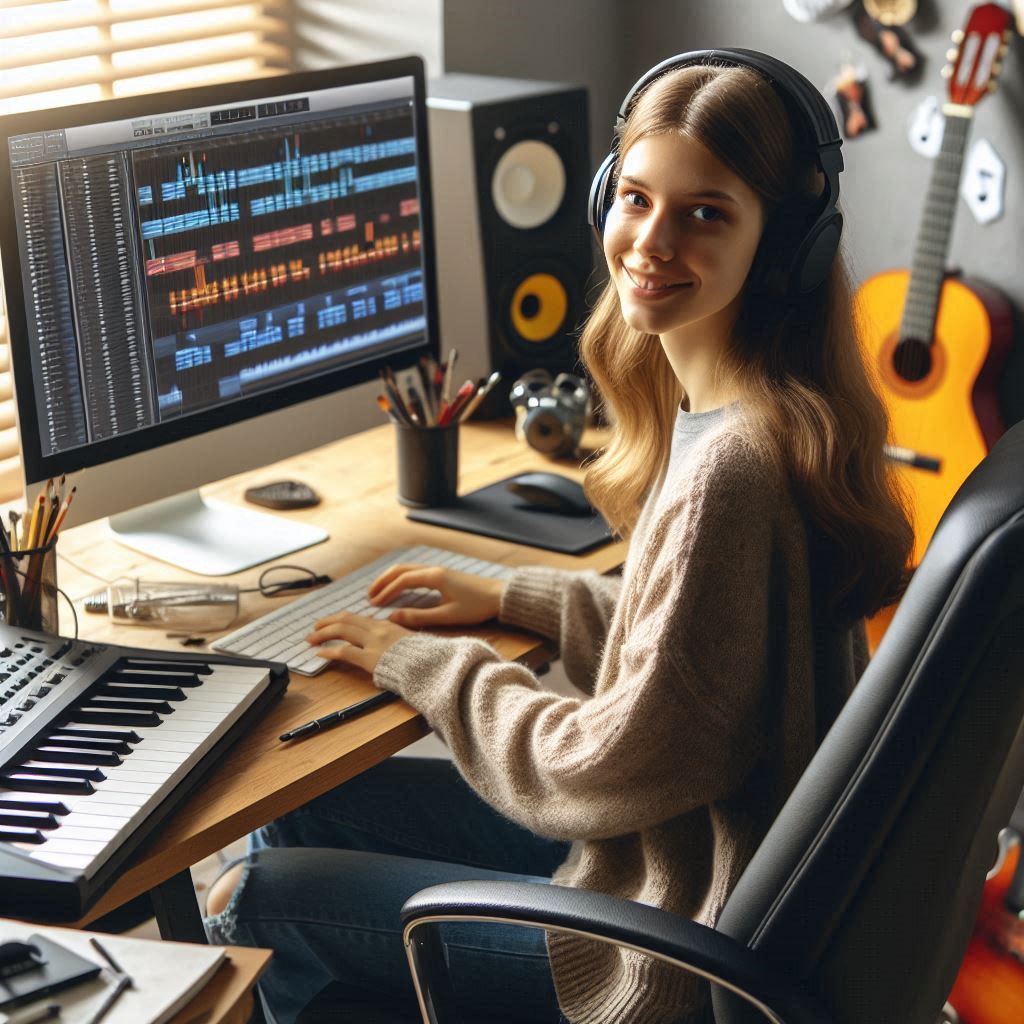
Introduction
Alternative music, also known as alt-rock, is a genre of music that emerged in the 1980s as a reaction against mainstream, commercially successful rock bands. It includes a wide range of sub-genres such as grunge, indie rock, shoegaze, and post-punk, to name a few. Understanding alternative music is important as it offers a unique perspective on society and culture.
Alternative music as a form of expression:
Alternative music offers a different perspective on the world than the mainstream. It delves into social, political, and cultural issues and provides a platform for alternative forms of expression. From the angst-ridden lyrics of grunge to the ethereal soundscapes of shoegaze, alternative music provides an escape from the mundane.
A platform for diverse artists:
Alternative music provides a platform for artists who don’t fit into the traditional mold of a rock star. It allows for experimentation and diversity, as artists are free to blend different genres to create something unique. Alternative music is also more inclusive, welcoming artists regardless of their race, gender, or sexual orientation.
The importance of understanding alternative music:
Understanding alternative music is important for several reasons. It provides insight into the cultural and social issues of the time, allowing us to gain a new perspective. It also offers a chance to discover new artists and genres that might not otherwise receive mainstream recognition. Most importantly, alternative music encourages us to think beyond our preconceptions and to open our minds to new possibilities.
Alternative music is more than just a genre of music. It’s a platform for diverse voices and alternative forms of expression. Understanding alternative music is important as it offers a unique perspective on society and culture, and encourages us to think beyond our preconceptions.
Read: How did the Hip Hop Genre get so Popular?
History of Alternative Music
Alternative music, also termed alt-rock, emerged in the late ’70s, gaining popularity in the ’80s and ’90s. It represents non-mainstream music, often signifying non-conformity, individualism, and anti-establishment views. In this piece, we’ll delve into the genre’s origin and evolution, its trailblazers, and its ’80s and ’90s impact.
Origin and Development
Alternative music is often traced back to the punk movement of the 1970s. Bands like The Ramones, The Sex Pistols, and The Clash took a rebellious stance against the mainstream and created music that was raw, energetic, and often political. As the punk movement evolved, it gave rise to post-punk, a more experimental and artsy version of punk, which in turn led to the emergence of alternative music.
The term “alternative music” was first used in the 1980s to describe a diverse range of music that did not fit into the mainstream rock or pop categories. It encompassed a variety of subgenres, including indie rock, college rock, gothic rock, and grunge, among others. Alternative music was often characterized by its use of unconventional instruments, non-standard song structures and lyrics that dealt with unconventional topics.
Pioneers in Alternative Music
Several bands are credited with pioneering the alternative music movement. These include:
- R.E.M. – formed in 1980, R.E.M. was one of the first alternative bands to achieve mainstream success. Their jangly guitars, introspective lyrics and DIY ethos inspired a generation of musicians.
- The Smiths – led by the enigmatic Morrissey, The Smiths were one of the most influential alternative bands of the 80s. Their melancholic, literate songs and distinctive sound set them apart from their contemporaries.
- Sonic Youth – formed in 1981, Sonic Youth blended noise rock, avant-garde and punk influences to create a sound that was uniquely their own. They were known for their experimental guitar tunings and dissonant soundscapes.
- Nirvana – perhaps the most iconic alternative band of the 90s, Nirvana brought grunge music to the mainstream with their album “Nevermind”. Their raw, emotional sound and frontman Kurt Cobain’s tragic death cemented their place in music history.
Impact of Alternative Music in the 80s and 90s
Alternative music had a significant impact on popular culture during the 80s and 90s. It offered a new sound and style that appealed to disaffected youth and challenged the status quo. Some of the ways in which alternative music made an impact include:
- It gave rise to a new wave of DIY musicians who rejected the manufactured pop that dominated the charts. Many alternative bands started out by self-releasing their music, booking their own shows, and building a grassroots following.
- It challenged traditional gender roles and pushed back against the hyper-masculine image of rock music. Female-fronted bands like Siouxsie and the Banshees and Lush gained a substantial following, and many male alternative musicians rejected the macho posturing of their predecessors.
- It influenced fashion and style. Alternative music was often associated with a particular look, characterized by ripped jeans, leather jackets, Doc Martens, and flannel shirts. This look became a fashion statement for many young people.
- It paved the way for other alternative subcultures, such as the rave and electronic music scenes. The DIY ethos and anti-establishment sentiment of alternative music inspired a whole generation of artists and musicians.
Basically, alternative music is a diverse and influential genre that has had a significant impact on popular culture. Its origins can be traced back to the punk movement of the 1970s, and it has since evolved to encompass a broad range of subgenres and styles.
The pioneers of alternative music, such as R.E.M., The Smiths, Sonic Youth, and Nirvana, inspired a generation of musicians and challenged the status quo. Alternative music continues to be an important part of the music landscape, pushing boundaries and inspiring new generations of fans.
Read: 10 African Music Festivals You Must Attend in Your Lifetime

Characteristics of Alternative Music
Alternative music is a genre that has grown in popularity, thanks to the unique sound and lyrics it offers. This type of music emerged in the late 1970s, as an alternative to mainstream music. Alternative music is considered a subculture of rock music, and it has become a movement that has influenced many artists around the world.
Innovative Tech Solutions, Tailored for You
Our leading tech firm crafts custom software, web & mobile apps, designed with your unique needs in mind. Elevate your business with cutting-edge solutions no one else can offer.
Start NowOne of the characteristics of alternative music is its distinctive sound and instruments used. Alternative music often features distorted electric guitars, bass guitars, and drums. Furthermore, this type of music frequently incorporates unconventional sounds from alternative instruments like synthesizers, traditional percussion, and organ. The sound of alternative music is unique and stands out from other music genres.
A Journey through Its Unique Sound, Introspective Lyrics, and Non-Conventional Approach
Another characteristic of alternative music is its lyric themes and patterns. The lyrics in this genre tend to be more introspective and emotional. They deal with social issues like politics, love, personal growth, and self-discovery. Alternative music often features lyrics that are raw and unapologetic. The lyrics are designed to make the listeners feel as if they are not alone in their struggles.
Alternative music also has a tendency to be non-commercial. This means that the music is not designed to appeal to a wide audience and is not mainstream. The artists in this genre focus more on creating music that speaks to their individualistic and artistic vision. Consequently, alternative music artists are more likely to experiment with their sound and create music that is not conventional.
Essentially, alternative music is a genre that offers a unique sound, lyrics, and a non-conventional approach to music. It has grown in popularity over time and continues to influence many artists worldwide. As a listener, alternative music offers a fresh sound that often explores more challenging topics, making it relatable to many people.
As an artist, alternative music allows for more creative experimentation, which helps them develop a unique sound to present to their audience. Overall, alternative music is an exciting genre that provides a platform for artists to create music that reflects their individualistic vision.
Read: How to Become a Music Producer
Types of Alternative Music
Alternative Music, a diverse genre, includes various musical styles from recent decades. This section explores its subcategories, popular genres, and growth factors.
Categories and subcategories
Alternative Music is characterized by its departure from mainstream sounds and styles. It can be divided into several subcategories, which include:
- Indie Rock: This is a subcategory of Alternative Music that is characterized by its unique sound and style that diverges from mainstream rock. Indie rock bands are typically unsigned or signed to smaller independent labels.
- Experimental Rock: This subgenre of Alternative Music is known for its unconventional approach to creating music. It features unusual sounds, rhythms, and melodies that challenge traditional rock sensibilities.
- Post-Punk: A subgenre that emerged in the late 70s and early 80s. This genre of Alternative Music is characterized by its use of dissonance, distortion, and jagged rhythms.
- Shoegaze: This is a subgenre of Alternative Music that is characterized by its use of ethereal, dreamy sounds and heavily distorted guitars. It emerged in the late 80s and early 90s.
- Electronic Music: This is a broad category that covers a wide range of Alternative Music genres that use electronic instruments and production techniques. Examples include IDM, Ambient, and Techno.
Examples of popular alternative music genres
Some of the more popular Alternative Music genres that have emerged over the past few decades include:
- Grunge: This genre of Alternative Music emerged in the early 90s in Seattle. Popular bands in this genre include Nirvana, Pearl Jam, and Soundgarden.
- Emo: This genre of Alternative Music emerged in the early 2000s. It is characterized by its emotional and introspective lyrics and was popularized by bands like Fall Out Boy and My Chemical Romance.
- Britpop: This genre of Alternative Music emerged in the UK in the late 80s and early 90s. It is characterized by its melodic and catchy tunes and was popularized by bands like Oasis and Blur.
- Industrial: This genre of Alternative Music emerged in the late 70s and early 80s. It combines rock and electronic music and is characterized by its heavy use of synthesizers and drum machines. Popular bands in this genre include Nine Inch Nails and Ministry.
- New Wave: This genre of Alternative Music emerged in the late 70s and early 80s. It is characterized by its use of synthesizers and electronic instruments and was popularized by bands like Duran Duran and Depeche Mode.
Factors influencing the emergence of new alternative music
Several factors have contributed to the growth and evolution of Alternative Music genres. These include:
- Technological advancements: The development of new musical instruments, software, and recording techniques have enabled musicians to create new and innovative sounds.
- Cultural shifts: Alternative Music has often been associated with youth culture and countercultural movements. As societal norms and values change, so too does the music that young people listen to and create.
- Access to information: The rise of the internet and social media has made it easier for musicians to connect with each other and share their music with a wider audience. This has facilitated the growth and diversification of Alternative Music genres.
- Independent record labels: Alternative Music has often been associated with independent record labels that provide a platform for artists who do not conform to mainstream musical or commercial norms.
- Radio and music media: Alternative Music has been popularized through college and independent radio stations as well as music media outlets that focus on promoting non-mainstream music.
In fact, Alternative Music is a diverse and ever-evolving genre that encompasses a broad range of musical styles that challenge mainstream sensibilities. It has its roots in countercultural movements and the desire of musicians to create music that reflects their unique voices and perspectives. As technology and societal norms continue to shift and evolve, so too does the music that defines Alternative Music genres.
Read: The Rise of Streaming Services and Their Impacts on the Music Industry

Importance of Alternative Music
Alternative music is a genre that originated in the 1980s and has continuously evolved over time. It is defined by its departure from mainstream music, exploring non-traditional sounds and lyrics. Although alternative music has often been associated with being “rebellious,” it plays an essential role in the music industry, culture, and society in general.
Role in expressing non-mainstream views and perspectives
One of the primary functions of alternative music is to express non-mainstream views and perspectives. Mainstream music often conforms to the conventions set by the industry and fails to address issues affecting society. Alternative music has consistently challenged the status quo; it dissects complex issues, provides platforms for unheard voices, and gives outsiders a sense of belonging.
For example, alternative bands like Rage Against the Machine and System of a Down are renowned for their politically charged lyrics and calls for social justice. These bands use their music as a tool to raise awareness and challenge authorities to create change. By doing so, they not only inspire their fans to question the world, but they also create meaningful conversations around important issues.
Influence on contemporary music
Alternative music has had a significant impact on contemporary music. Elements from alternative music genres such as grunge, punk, and indie rock have made their way into mainstream music. Many popular artists today, including Billie Eilish and Twenty One Pilots, identify as having alternative roots and continue to push boundaries with their music.
Moreover, the DIY (Do It Yourself) ethos epitomized by alternative music has influenced contemporary musicians to be bolder, more authentic, and less formulaic in their production. Musicians are now using alternative music techniques such as lo-fi and indie, which are prevalent in genres like bedroom pop.
Expression of individuality and creativity
Alternative music values individuality and encourages creative expression. It allows musicians to experiment with unconventional sounds, create unique melodies, and explore non-linear structures. Alternative musicians tend to write deeply personal and introspective lyrics that give insight into their experiences, struggles, and triumphs.
For example, alternative artists like Lana Del Rey and Bon Iver are notable for their deeply emotive and poetic lyrics. Del Rey speaks candidly about heartbreak and societal expectations, while Bon Iver delves into themes of isolation and self-discovery. These artists’ music gives listeners a chance to reflect and connect with themselves on a deeper level.
Alternative music plays an essential role in expressing non-mainstream views and perspectives, influencing contemporary music, and encouraging individuality and creativity. It serves as a platform for the frustrated and overlooked, creating a space for people to express themselves and challenge societal norms. Above all, alternative music has proven to be a formidable force in music and culture, driving important conversations, and shaping our understanding of the world.
Read: How to Build a Music Record Label
Challenges of Alternative Music
Alternative music is a genre of music that emerged in the 1980s as a counter to mainstream music. It is a form of music that is not easily defined and is all about experimentation and originality. While alternative music has a loyal fan base, it faces several challenges.
Struggles for acceptance
One of the biggest challenges that alternative music faces is the struggle for acceptance. Alternative music was created as an alternative to mainstream music. However, it has not been easy for the genre to gain acceptance. Many people still prefer mainstream music and are not open to exploring alternative music.
In addition, alternative music is still seen by some as a niche genre, which limits its reach. As a result, alternative musicians struggle to reach broader audiences. Alternative music festivals and concert venues are often smaller and less mainstream than their counterparts, which can make it difficult for alternative artists to reach new fans.
Seamless API Connectivity for Next-Level Integration
Unlock limitless possibilities by connecting your systems with a custom API built to perform flawlessly. Stand apart with our solutions that others simply can’t offer.
Get StartedChallenges of commercial success
Most alternative musicians create music for the love of it, but they also have bills to pay. The challenge for alternative musicians is to create music that is commercially successful without compromising their artistic integrity. This can be a difficult balance to strike.
Mainstream record labels tend to place more emphasis on commercial success than artistic integrity, which can result in alternative musicians signing contracts that bind them to specific sound or style, limiting their ability to experiment musically.
Importance of preserving alternative music
Despite the challenges that alternative music faces, it is important to preserve the genre. Alternative music provides a platform for artists to explore their creativity in ways that they may not be able to do in other genres. Alternative music has also influenced mainstream music in ways that cannot be ignored.
Moreover, alternative music is often a reflection of the time and place in which it was created. We should preserve this significant part of cultural history for future generations to appreciate and learn from.
Alternative music faces several challenges, including struggles for acceptance, challenges of commercial success, and the importance of preserving the genre. However, alternative music is a vital and important genre that provides artists with a platform to explore their creativity. It is also an important part of cultural history that should be preserved for future generations.
Read: Popular Myths About the Music Industry
Future of Alternative Music
Alternative music has come a long way since its inception in the 1980s. It has remained a prominent music genre and continues to evolve in the 21st century. As we look to the future, there are a few possibilities of growth and progress, the emergence of new sub-genres, and the evolution of alternative music.
Possibilities of Growth and Progress
Alternative music has always been a genre that has appealed to a specific set of audiences. However, with the rise of technology and social media, the genre has become more accessible to a wider audience. This means that alternative music has the potential for more growth and progress. As more people become exposed to the genre, they may find that they appreciate the unique sounds and themes that alternative music offers.
Additionally, the music industry itself is evolving, with streaming services like Spotify and Apple Music making it easier for artists to promote their work and reach a wider audience. This accessibility can also enable more artists to gain recognition and present their interpretation of alternative music.
Emergence of New Sub-genres
Alternative music has always been a genre that embraces experimentation and a willingness to explore new sounds and themes. With this in mind, it is not surprising that new sub-genres of alternative music continue to emerge. Some of the more recent sub-genres of alternative music include dream-pop, indie-folk, and electro-pop. These sub-genres offer new and exciting interpretations of alternative music that appeal to a wider audience and provide more opportunities for artists to innovate.
Evolution of Alternative Music
The genre of alternative music will likely keep evolving in novel ways. A shift from 90s grunge and post-punk to more electronic, experimental music has already happened. This trend will likely persist as alternative artists continue to experiment with unique sounds and techniques.
Furthermore, with the help of technology, alternative music has started to incorporate elements of other genres like hip-hop and R&B. This cross-genre experimentation is likely to continue, leading to new sub-genres and sounds that appeal to a broader audience.
The future of alternative music shines brightly with growth, emergence of new sub-genres, and genre evolution. It will persistently challenge musical boundaries, offering fresh sound interpretations and themes. For alternative music fans, it’s a prime time to explore this genre’s rich artist and music array.
Conclusion
Alternative music has evolved from being an underground genre to becoming an influential and mainstream movement over the years. A unique sound, style, and attitude characterize it, setting it apart from the conventional music industry.
Alternative music is not just a genre, but a way of life and a culture that seeks to challenge societal norms and beliefs, and to provide a platform for creative expression and individuality.
Understanding and appreciating alternative music is important in promoting diversity, creativity and innovation in the music industry. It allows for the exploration of different perspectives and experiences, and encourages the representation of marginalized communities and voices.
Without alternative music adding diversity and originality, the same sounds and styles would dominate the music industry. Alternative music provides a necessary balance to the mainstream and serves as a reminder that there is always room for creativity and individuality in music.
To support alternative music, it is important to attend shows, buy merch, and stream music from independent artists and labels. Sharing and promoting alternative music on social media and in your personal networks can also have a significant impact in spreading awareness and helping these artists reach a wider audience.
On a final note, alternative music is an important and vibrant part of the music industry, and it is crucial that we continue to support and promote it. By doing so, we can help to ensure that music remains a diverse and inclusive art form that reflects the full spectrum of human experience and creativity.
Read: The Power of Music Therapy: Can Listening to Music Improve Your Health?
Before You Go…
Hey, thank you for reading this blog to the end. I hope it was helpful. Let me tell you a little bit about Nicholas Idoko Technologies. We help businesses and companies build an online presence by developing web, mobile, desktop, and blockchain applications.
We also help aspiring software developers and programmers learn the skills they need to have a successful career. Take your first step to becoming a programming boss by joining our Learn To Code academy today!
Be sure to contact us if you need more information or have any questions! We are readily available.
Transform Business with Custom CRM & ERP Solutions
Elevate your operations with a CRM or ERP tailored for you. Let’s build the perfect solution that others can't replicate—crafted to match your business's needs like no other.
Get Started









